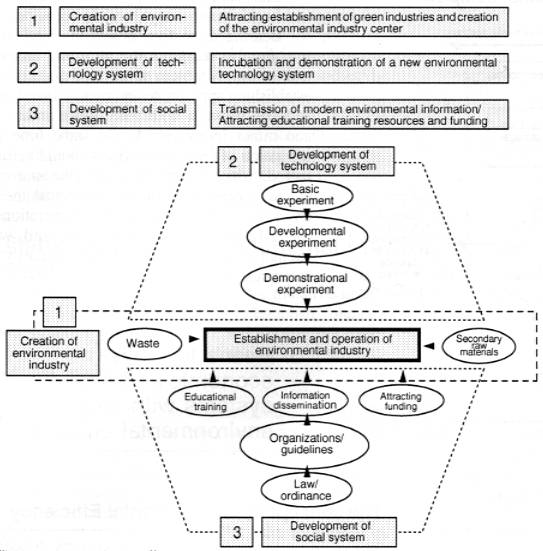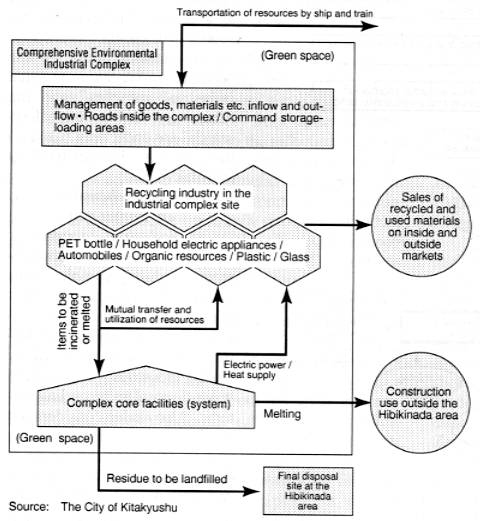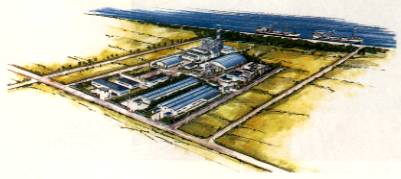Chapter I -2 :Quality of the Environment in Japan 1998
Chapter I: Towards a Socio-economic System with Environmentally Sound Material Cycles
2. Attempts by the industrial system towards a socio-economic system with environmentally sound material cycles
Actions for an industrial system with sound material cycles
Meaning of the zero-emission concept
"Zero-emission" is a new way of thinking which has emerged with the shift in general perceptions of the earth. While formerly the earth was seen as something "unlimited and unchanging" it is now commonly regarded as "limited and degrading." Zero emission means that industries/companies keep the amount of wastes generated by their activities to a minimum, and that they should properly recycle such waste as they inevitably produce in collaboration with other industries, thereby establishing an appropriate recycling system.
Zero-emission collective industrial area
The Japan Environment Corporation plans to create collective industrial areas, for example, "zero-emission industrial areas," where middle-size and small-size companies, which are not able to carry out measures for effective resource circularity independently, are gathered together and coexist as members of a socio-economic system with environmentally sound material cycles.
Sai-no-kuni double plant project
In Saitama Prefecture, a plan called "Sai-no-kuni double plant project" has been under discussion since 1996 to promote the effective utilization of various wastes as raw materials or fuel at cement factories operating in the Prefecture. It is part of the Prefecture's programme for a widespread waste disposal and recycling system (local zero emission).
Model for the industrial system with sound material cycles: The City of Kitakyushu
Industrial system with sound material cycles
To achieve zero-emissions and a socio-economic system with environmentally sound material cycles, it is necessary to nurture the waste disposal and recycling industries and integrate these into a new industrial system where mainstream industries and minor industries can operate harmoniously in proper circularity. This can be achieved by reforming the current industrial system wherein efforts are made to develop only mainstream industries at the expense of minor industries which are ignored.
There is a movement under-way in the City of Kitakyushu which could serve as a model for such progressive reformation of industrial systems and the creation of a socio-economic system with environmentally sound material cycles.
Towards the creation of an environmental industrial city
Based on its experience of past struggles with industrial pollution, the City of Kitakyushu is aiming at the dynamic transformation of the local industrial structure into an industrial system of resource circularity. Kitakyushu is aiming to change from a huge and intensive industrial city to an environmental industrial city. It is hoping to present a good model of a working socio-economic system with environmentally sound material cycles. The policy places emphasis on "demonstrational research" and "technology development" in order to promote an "environmental industry." Also emphasized is the "improvement of foundation for education and basic research" and the "promotion of international cooperation on the environment," while considering the social capacity for acceptance on the part of local citizens.
Basic Concept of the City of Kitakyushu Eco-Town 
Source: The City of Kitakyushu
Activities based on the Eco-Town Plan of Kitakyushu
Following the concept indicated in the chart above, the City of Kitakyushu plans to create a center of environmental industry in Hibiki Nada district, a reclaimed seaside area of approximately 2,000 ha. This area has sufficient port facilities to enable it to serve as a center of international resource distribution.
At present, plans for the "comprehensive environmental industrial complex" and the "center for demonstrational research" are under way based on the Eco-Town Plan of the City of Kitakyushu.
(1) Comprehensive environmental industrial complex
The comprehensive environmental industry complex aims not only at improving the recycling rate but also at the creation of a zero-emission industrial system to be achieved by linking industries with advanced waste disposal and recycling systems. Also under consideration is a more collective recycling system, involving the whole of Kyushu Island and the Chugoku and Shikoku areas, by making the most of the favorable conditions existing in the Hibiki Nada district, namely, its capacity for large-scale transportation by sea and train, thus minimizing the amount of road transportation.
As the first project in the move towards such a system, Nishi-Nippon PET-Bottle Recycle Co. Ltd. (a public and private sector collaboration) will commence operations in 1998. Furthermore some electric appliance companies have set up research groups to establish a "recycling facility for wasted electric appliances," which would recycle not only those electric appliances used in the home but also OA equipment, used cars and plastic.
Possible Structure of the Comprehensive Environmental Industrial Complex 

Artisit's visualization of comprehensive environmental industrial complex
(2) The Center for Demonstrational Research
This research center will engage in investigation and research into the effectiveness and safety of waste treatment and recycling technology. Because these issues are closely related the Center for Demonstrational Research has a core facility at the "Research Institute of Resource Circularity and Environmental Control Systems" at Fukuoka University. The Center for Demonstrational Research is planned to increase facilities for research, training and information gathering, as well as provide a venue for joint research projects with private companies.
Cooperation between industries, academics and the government
It can be said that the development of advanced disposal technologies and the attempts to maximize the potentials of recycling are the first signs of a new era - the industrialization of environmental conservation. In order to fully establish this industry, it is important to ensure solid environmental policy based on the results of various demonstrational tests. It is also necessary to change local industrial structures with the participation of various industries both inside and outside the local communities. For the realization of such environmental industries, joint actions between industries, research institutes and government administrations is essential.
Scope for the promotion of environmental industries
The creation and promotion of the environmental industry of disposal and recycling as a "minor industry" supported by advanced technologies provided by the private sector companies, will lead to the development of local communities in both economic and environmental terms.
If such development is to occur, it is important to bear the following four points in mind:
- (1)
- the establishment of a co-operative and collaborative system of transportation of wastes and recycled materials covering a large area.
- (2)
- the promotion of equipment testing and technological demonstration including positive support from public bodies.
- (3)
- transparency of projects, waste recycling administration and technological support projects, with the facilitation of easy access to information.
- (4)
- cooperation and collaboration between citizens, companies and governmental administrations on every possible occasion.
Bearing these four points in mind, it is important to reinforce the recycling industry and the supply system of recycled materials by establishing appropriate and tightly linked connections between both mainstream industries and minor industries. At the same time the utilization of recycled products should be promoted, which in turn will lead to the appropriate advancement of our environmental industry. This will lead to the effective operation of the circular industrial system, and will strengthen the resilience of the circularity of resources paradigm.